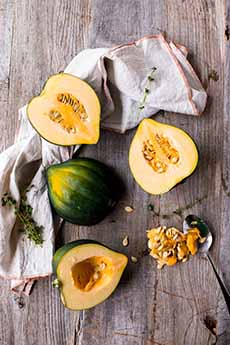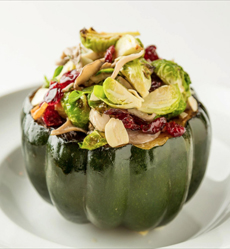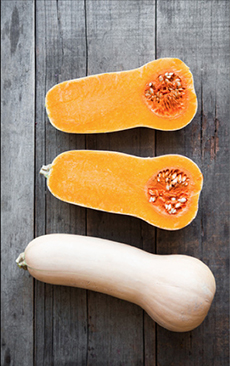|

[1] Acorn squash, an American favorite (photo © Kim Daniels | Unsplash).

[2] Bake an acorn squash and stuff the halves with other veggies, including root vegetables. Here, Brussels sprouts, dried cranberries and sliced almonds atop brown rice (photo © Chef Eric LeVine).

[3] Here’s the recipe from Farmgirl Gourmet (photo © Farmgirl Gourmet).

[4] Butternut squash joins acorn squash as the most commonly found winter squash varieties in grocery stores (photo © Good Eggs).
|
|
September 7th is National Acorn Squash Day, celebrating one of the most popular of the winter squash varieties. Known for its compact size, the squash can be baked, mashed, even fried for tempura. Our favorite is simply baked with a drizzle of maple syrup, but we can’t resist any of the recipes below.
TYPES OF SQUASH
Acorn squash is one of 11 types of winter squash that can be found in American markets. Acorn is joined by banana, buttercup, butternut, delicata, hubbard, kabocha, pumpkin, spaghetti, sweet dumpling, and turban squash.
Winter squash has a very thick skin and can be stored for months. It needs to be cooked.
Summer squash has a thin, edible peel and a limited shelf life. It can be eaten raw or cooked.
There are three species of squash, all native to the Americas:
Curcubita pepo includes acorn, butternut, pumpkin, summer squash like yellow squash and zucchini, and others.
Curcubita moschata, represented by the cushaw, Japanese pie, large cheese pumpkins and winter crookneck squashes. These arose, like Curcubita pepo, in Mexico and Central America. Both were and are important food sources, ranking next to maize and beans.
Curcubita maxima includes Boston marrow, delicious, Hubbard, Marblehead and Turks turban. They originated near the Andes Mountains or valleys.
> The History Of Acorn Squash
> The Different Types Of Squash
ACORN VS. BUTTERNUT SQUASH
These two varieties are most commonly found in markets.
Acorn squash are so-named because of their acorn shape. They are dark green in color, often with a splash of orange, and with distinctive longitudinal ridges on their exterior. The flesh is yellow-orange.
Acorn squash are smaller than butternut squash: one to two pounds in weight, four to seven inches long).
Acorn, like the other winter squash varieties, is highly nutritious. It’s packed with the antioxidant vitamin C and other nutrients.
Cup for cup, acorn squash is the most nutritious of all the winter squash varieties—but it’s smaller and thus yields less meat*.
Butternut squash are cylindrical with a bulb at the bottom, or an hourglass shape. They are light orange in color, and bright orange inside.
Butternut squash weighs an average of 2 to 3 pounds and is 8 to 12 inches in length.
Both are similar in flavor and texture.
Substitute: Acorn squash is naturally a bit sweeter than butternut squash, which is nuttier. Either can be substituted with buttercup squash, which is generally drier.
ACORN SQUASH RECIPES & TIPS
The defined ribs and deep green color of an acorn squash make it an attractive vessel. The halves can be hollowed out after baking; the flesh mashed and the shells used as decorative bowls for the mashed squash, squash soup, rice, or stuffing. Other favorites:
Acorn Squash Salad With Maple Vinaigrette
Acorn Squash Soup With Gnocchi
An Easy Way To Peel Winter Squash
Broiled Portabella Mushrooms Stuffed With Mashed Acorn Squash
Butternut Or Acorn Squash Soup With Latin Garnishes
Different Stuffings For Acorn Squash
Fall Salad Mix & Match
Fall Salad With Brussels Sprouts & Acorn Squash
Harvest Cobb Salad
How To Cut & Peel & Cut Winter Squash
How To Scoop & Roast Winter Squash Seeds
Hummus Bowls With Acorn Squash
Individual Squash Bowls For Soups, Grains & More
Ingredients For Stuffed Squash
More Fall Salads With Acorn Squash
Stuffed Acorn Squash
Vegetable Tempura
Winter Panzanella (Tuscan bread salad)
Winter Squash Tart
Winter Vegetable Kabobs
________________
*In addition to referring to the flesh of animals used as food, “meat” also designates the edible part of anything, e.g. a fruit or nut.
CHECK OUT WHAT’S HAPPENING ON OUR HOME PAGE, THENIBBLE.COM.
|





